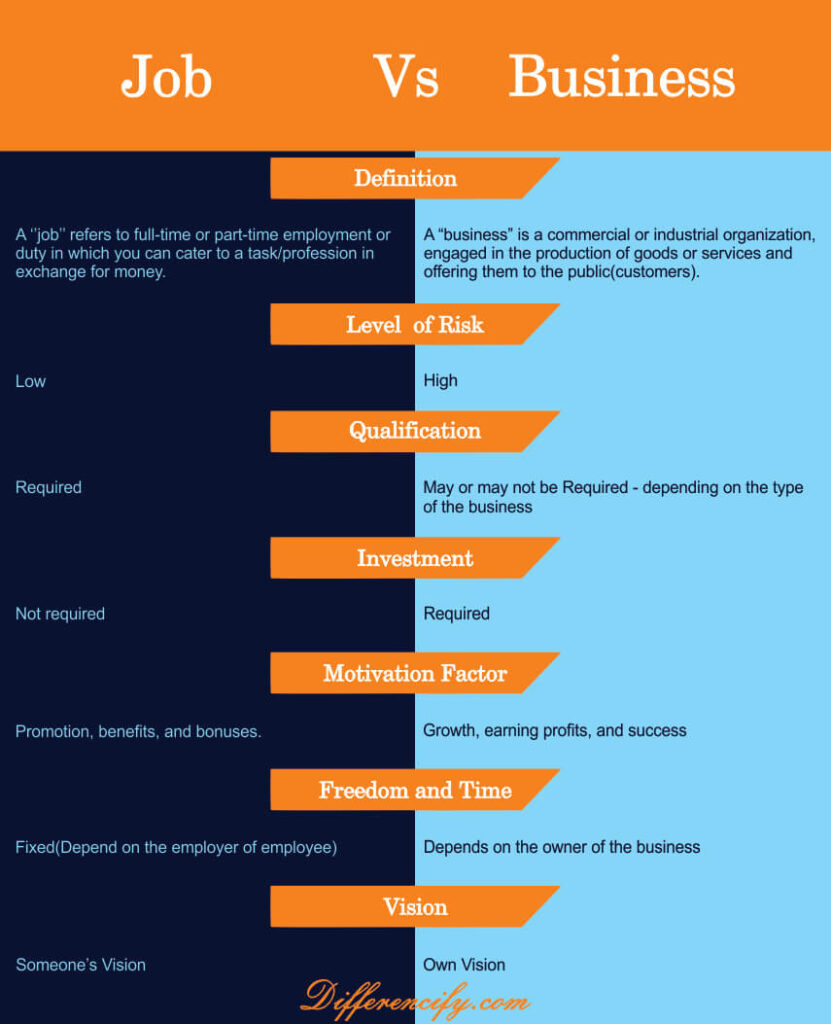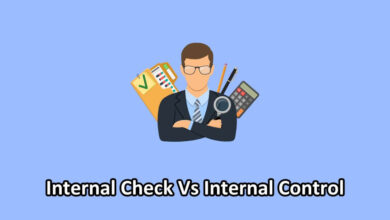Job Vs Business : 10 Differences, Pros and Cons, and Guide (With Table)
Job and business are two of the most popular terms in the entire business vocabulary. Yet, they remain the most misused ones as well, especially when it comes to defining their inherent differences and role in any given business activity. Jobs require you to work a fixed number of hours, while business is your own. Businesses have the potential to make a lot more money than jobs do. However, businesses also demand that you put in long hours and take on many responsibilities. So, In this article, we will cover definitions, pros and cons, and also a table that compares both job vs business.
Job Vs Business
| Job | Business |
|---|---|
| A job refers to full-time or part-time employment or duty in which you can cater to a task or profession in exchange for money. | A business is a commercial or industrial organization engaged in the production of goods and services and offering them to the public(customers) |
| It has a low level of risk. | It has a high level of risk. |
| It requires qualification. | In the case of business, qualification may or may not be required – depending on the type of business. |
| Job does not require any investment | Businesses require investment. |
| Promotion, benefits, and bonuses are the motivation factors of a job. | The motivation factors of a business are growth, earning profits, and success. |
| Freedom and time are fixed(depending on the employer of the employee). | The ascertainment of the time depends on the owner of the business. |
| The job involves working for an employer. | Business involves owning a company or organization. |
| It typically offers a set schedule and benefits. | It typically offers more flexibility, but also more risk and responsibility. |
| The employee is not in charge of the business’s direction or operations. | The owner or management is in charge of direction and operations. |
| It is working for someone’s vision. | It is working for your own vision. |
You Can Also Read:
- Difference Between Sole Proprietorship and Partnership
- Difference Between Businessman and Entrepreneur
- Difference Between Entrepreneur and Manager
What Is Job?
A job is a temporary position with an employer. Jobs can be full-time or part-time, and they can be located in an office, factory, store, or another workplace. Jobs usually involve performing specific tasks for an employer in exchange for compensation, such as an hourly wage or annual salary.
Advantages and Pros of a Job
- Experience And Opportunities: Being an employee and working with an organization you get an opportunity to work and research on different projects that you are given by the company. This factor helps you to broaden your vision and enhance your knowledge and skills.
- Fixed Wages: The most obvious advantage is that you get a regular paycheck. This can help you pay your bills and save up for your future.
- Fixed Routine: Having a job also gives you a sense of stability and routine. You know when you need to be at work and what is expected of you. This can provide a feeling of security and predictability in your life.
- Social Opportunities: A job can also provide social opportunities and allow you to meet new people and make friends.
- Promotions: Being an employee, you get a great chance and opportunity to be promoted. The more you work hard for the company, the more you have the chance to get promoted faster.
- Holidays: Being an employee, you can freely enjoy the rest of your life aspects after your working hours. Some companies even also provide sick leaves and annual leaves to their employees.
Disadvantages(Cons) of a Job
- Less Control/Authority: You may have less control over your work schedule. You will likely have to work the hours that your employer sets, which may not be ideal for you.
- Work Out of Your Skills: You may have to do tasks that you don’t enjoy or that are outside of your skill set. This can make your job less enjoyable and can lead to frustration.
- Low Wages: Finally, jobs often come with a lower salary than starting your own business. This is because you are not sharing in the profits of the company, so your wages will be lower.
- Rules And Policies: Being an employee, you cannot work according to your own choice and rules. Instead, you have to follow all the rules and regulations of the company
- Skills And Qualification: The most challenging factor of getting a job of your own choice is qualification. It may require you a degree, experience, and certifications for the domain you want to work on.
What is Business?
The dictionary definition of a business is a commercial or industrial organization engaged in the production of goods or services and offering them to the public. A business entity seeks to profit from its enterprise. Additionally, businesses have the ultimate goals and objectives for the growth of the companies. There are many different types of businesses. Some businesses are small, while others are large. Some businesses are local, while others are international. And some businesses are sole proprietorships, while others are corporations.
Advantages(Pros) of a Business
- Being Your Own Boss: You are your own boss and have complete control over your work schedule.
- Profit And Earning: You can also make more money in a business than you can in a job.
- Deduction Of Expenses: Another pro of owning a business is that you can deduct many expenses from your taxes, which can save you money.
- Freedom And Flexibility: A business can offer you more flexibility and freedom than a job.
Disadvantages(Cons) Of a Business
- Financial risk: Starting a business requires a significant financial investment. There’s no guarantee that you’ll see a return on your investment, and you could end up in debt if things don’t go as planned.
- Requires dedication: Running a successful business requires a lot of dedication and hard work. You’ll need to be prepared to sacrifice your personal time and social life in order to make your business a success.
- Competition: When it comes to owning a business, you are not the only one there. In fact, you have hundreds and thousands of competitors with you who may are doing better than you. It means that in order to grow your business, you need to have a look at your competitors as well.
- Requires financial investment: Businesses cost money to run and you’ll need enough of your own cash to cover the expenses for a few months (or longer).
- Poor choice of product or service: Your business success rests upon choosing a product or service that people want and will pay
Key Differences Between Job And Business
While comparing job vs business, we have described some of the key differences between them as well. They are as;
- A job is a temporary position with an employer. Jobs can be full-time or part-time, and they can be located in an office, factory, store, or another workplace. On the other hand, f a business is a commercial or industrial organization engaged in the production of goods or services and offering them to the public.
- A job typically involves working for someone else, while a business involves owning and operating your own company.
- A job usually provides a set salary or hourly wage, while a business typically generates income through sales or other forms of revenue.
- A job typically entails performing tasks as assigned by a boss or superior, while a business often allows for more creativity and autonomy in terms of what tasks are undertaken.
- Another clear distinction between the two can be seen when discussing costs. A business will require investments and startup costs, whereas a job does not.
- Another difference is that when you have a job, your employer typically sets your schedule for you. If someone decides to start their own business, they are typically responsible for setting their own hours.
The following table briefly compares job vs business.

You Can Also Read:
- Difference Between Accounting and Accountancy
- Difference Between Accountability and Responsibility
- Difference Between Manual and Computerized Accounting
Conclusions
The main difference between a job and a business is that a business offers the potential for financial independence, while a job is typically just exchanging time for money. A business usually requires more investment of time and money upfront but has the potential to earn much more than a typical job.
Some people prefer the stability and predictability that comes with having a job, while some folks feel more stable with having a business. Starting your own business can be very rewarding and satisfying, but it takes hard work and commitment. It’s important to carefully consider which option is right for you before making any decisions.
Reference Blogs:




Keep it up
Thanks for your blog, nice to read. Do not stop.
Thanks, Mr.Mark for reading and appreciating our blog.